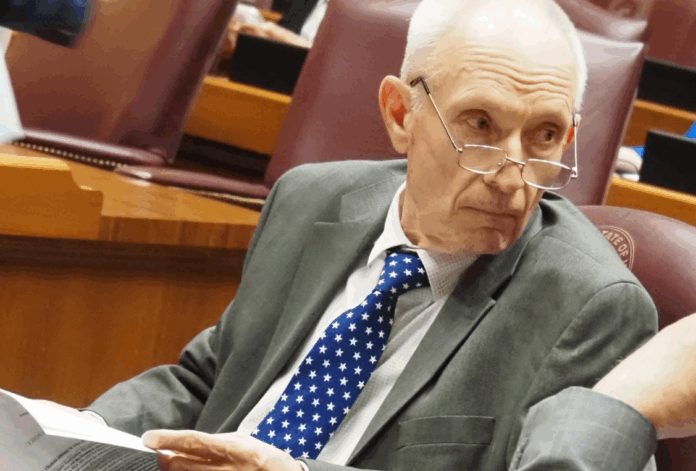
By Whitney Downard
Indiana Capital Chronicle
The majority of Statehouse Democrats opposed the 2025 budget — crafted over four months and passed by Republicans early Friday morning — decrying unvetted last-minute additions and cuts.
For chief House budget architect Rep. Jeff Thompson, the budget was one that “lives within our means” following a grim financial forecast the week before.
House Speaker Todd Huston gave a robust defense — and rare floor appearance — in favor of the legislation after nearly two hours of debate.

“This budget does so much. It continues to invest in K-12 education in every way. Even with a surprise shortfall in revenue, we made sure we protected K-12 and we did that,” said Huston, R-Fishers. “… House Bill 1001 builds on … what’s taking place in Indiana. It builds on that success. When we see a challenge — and when we get a challenge — we meet it and we excel through it.”
Democrats largely opposed the measure, citing the lack of funds for child care and Medicaid waiver waitlists while wealthy Hoosiers get tax dollars to send their children to private schools.
“This budget doesn’t just keep our government running, it impacts the real people — the Hoosiers — that are depending on us. They’re counting on us to pass a budget that, yes, will get balanced. But, more importantly, one that reflects their needs and values,” said Sen. Rodney Pol, D-Chesterton. “… Unfortunately, this budget falls short of that.”
Included in the last version of the budget is an expansion of school choice voucher eligibility, meaning that even families earning more than $220,000 — an estimated 3,000 students — will qualify.
One member from each party crossed caucus lines in the House, but it moved out of the chamber on a 66-27 vote.
The bill fared roughly the same in the Senate, where two Republicans voted against the proposal but one Democrat supported it, for a final vote of 39-11.
It now moves to Gov. Mike Braun for his signature.
Democrats lament funding shortfalls
The budget didn’t only impact K-12 education, but also the state’s various higher education institutions.
Rep. Matt Pierce, a Democrat from Bloomington, railed against last-minute language, slipped in without public testimony, that would give Braun complete control over the Indiana University Board of Trustees.
Other provisions would require reviews of tenured professors for productivity and publicly posted syllabi.
“April 24, 2025, is a date that will live in infamy,” said Pierce, who is employed by IU. “The faculty of our state universities were suddenly and deliberately attacked by the Republican supermajority.”
Rep. Chris Campbell highlighted another $1 million budget cut to a housing first program. Those dollars caused homelessness rates to drop by 14% in 2017, she said.
“Without this program our communities rely on to assist the unhoused, we should expect homelessness to not only continue but to likely increase,” said the West Lafayette Democrat. “I don’t understand how a legislature that has spent a lot of this session trying to criminalize homelessness is now trying to eliminate the one tool we have been using since 2017.”
The latter portion refers to an effort that would crack down on homelessness by making “street camping” on public property a crime. That language appeared in a handful of different bills but didn’t cross the finish line before the legislators left Indianapolis.
Rep. Carey Hamilton, D-Indianapolis, criticized the elimination of public broadcasting and trails funding. She said she would have supported cuts to the line items in light of the state’s finances, but “zeroing out these programs is a mistake that tells us they may never come back.”
But the narrowed eligibility for subsidized child care would make the shortage of options for parents worse, not better, she said.
“We can’t afford to make that cut in this budget. This is actually, exactly the moment we should be stepping up our investment in child care. Or, at least maintaining it,” she said. “But, instead, this budget steps back, choosing to invest in the wealthiest who don’t need it instead of those who do.”
In response to Democratic concerns in the Senate, Sen. Ryan Misher, the bill’s sponsor, said the measure builds for the future.
“I know there’s really no one going home feeling like they had a big win here — not a year that anybody would feel like it’s a big win,” concluded the Mishawaka Republican. “I think the best way to look at it is that it could have been much worse.”
Republicans add their concerns
While no House Republicans other than Thompson and Huston spoke on the budget, a handful of Senate Republicans chimed in — including two with several qualms.
Sen. Mike Young criticized his fellow Republicans for adding “14 pieces of language that have nothing to do with the budget,” including language on carbon sequestration. He also bemoaned individual line item increases while taxes on gas continue to grow.
“There’s all kinds of things in this current budget,” said Young. “… I think I would’ve looked at more of the cutting than I would about more of the spending which they did.”
Additionally, cigarette taxes will increase by $2 per pack, with proportional increases for other forms of tobacco. Those dollars will bring in an estimated $850 million in the next biennium.
Sen. Mike Gaskill, R-Pendleton, said he was struggling to support that tax increase but focused on the positives.
“There’s too much good in there to not vote for this budget,” he said.
While Young voted against the measure, Sen. Vaneta Becker, R-Evansville, supported it — despite her reservations.
“We don’t have enough money for health care and for Medicaid, but we can give a millionaire a voucher to send their kids to private school. It’s unconscionable,” said Becker. “… But the biggest thing I’m disappointed in is the Dolly Parton Imagination Library and the fact that we didn’t fund it.”
That line item was $6 million in the last budget cycle. First Lady Maureen Braun has vowed to raise those funds.





